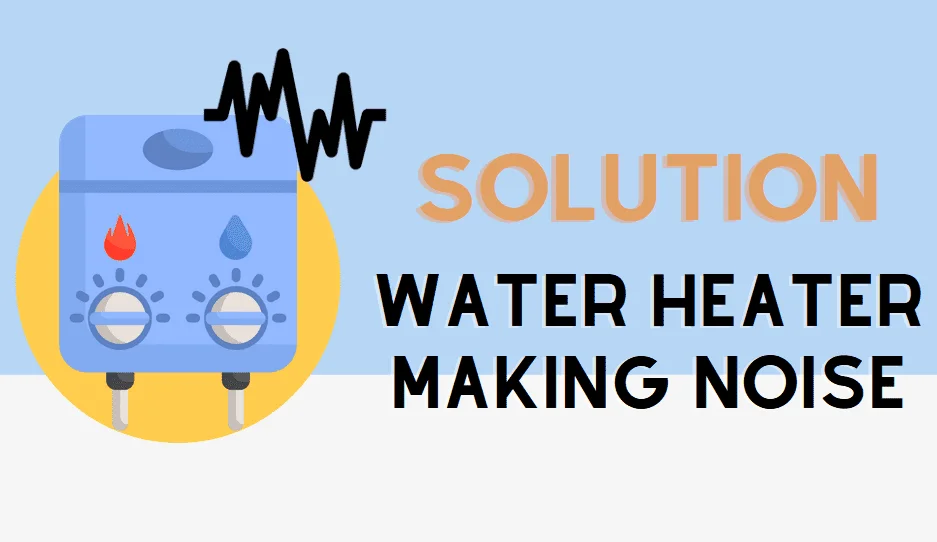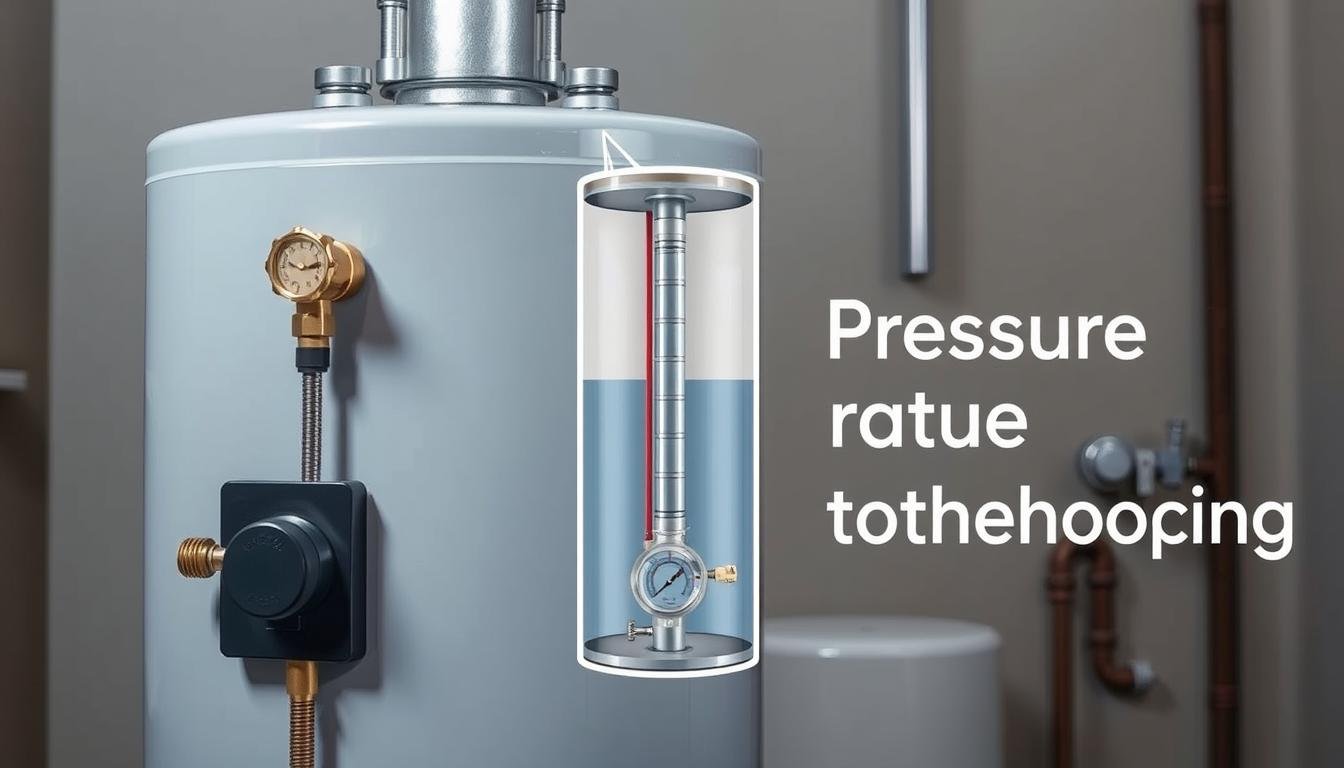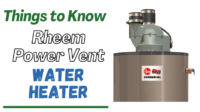Is your water heater making noise like a haunted plumbing system? A noisy water heater can be more than annoying. It might signal serious problems. Sounds like popping, rumbling, or high-pitched whistling mean your home needs help.
I’ll share the top secrets to diagnose and quiet your water heater noise. Whether it’s a minor issue or a big problem, this guide will help. You’ll learn what those sounds mean and how to fix them fast and safely.
By the end of this article, you’ll be a water heater noise expert. You’ll know when to use tools or call a plumber. Let’s explore water heater diagnostics and solutions together!

Understanding Why Your Water Heater is Making Strange Sounds
As a homeowner, I’ve learned that water heater noises can be more than just an annoyance. They’re actually important signals about your home’s hot water system. Not all sounds mean trouble, but some require immediate water heater troubleshooting.
Normal vs. Problematic Water Heater Sounds
Every water heater makes some noise during operation. The key is recognizing which sounds are normal and which indicate problems. Here are typical sounds you might encounter:
- Soft humming: Usually normal operational noise
- Light clicking: Typical during heating cycles
- Loud popping or crackling: Possible sediment buildup warning
- High-pitched whistling: Possible valve or pressure issue
Impact on Your Home’s Hot Water System
Persistent heater noise water problems can significantly impact your water heater’s efficiency and lifespan. Ignoring unusual sounds might lead to more expensive repairs or complete system failure.
| Noise Type | Potential Cause | Recommended Action |
|---|---|---|
| Rumbling | Sediment Buildup | Annual Tank Flush |
| Whistling | Valve Restriction | Valve Inspection |
| Sizzling | Potential Leak | Professional Evaluation |
Different Types of Water Heaters and Their Typical Noises
Different water heater types produce unique sounds. Gas water heaters might create more combustion-related noises, while electric models typically have different sound characteristics. Understanding these variations helps in effective water heater troubleshooting.
- Gas Water Heaters: More likely to have combustion-related sounds
- Electric Water Heaters: Generally quieter, with heating element noises
- Tankless Water Heaters: Minimal operational sounds
Common Causes of Water Heater Making Noise
When your water heater starts making unusual sounds, it’s important to know why. These noises can be a sign of bigger problems that might need fixing. Here are some common reasons for strange water heater sounds.
Sediment buildup is a big reason for most noise problems. As your water heater gets older, minerals and debris collect at the bottom. This buildup can make different sounds that might scare you.
- Popping or Crackling Sounds: These happen when steam bubbles get trapped under sediment. The bubbles bursting through the buildup makes popping noises.
- Banging or Hammering Noises: These are usually from water hammer or sediment moving in the tank.
- Whistling Sounds: These are often from blocked valves or high water pressure.
- Hissing Noises: These are usually from heating element issues or leaks.
Different water heaters can make different noises. Electric and gas models have their own sound issues. The age of your heater, water quality, and how well it’s maintained also affect the sounds you hear.
I suggest you listen to these sounds carefully. While some are okay, others might mean serious problems that need a pro to fix. Keeping your water heater in good shape can prevent most noises and make it last longer.
Identifying Sediment Buildup and Its Effects
Keeping your water heater in good shape is key to avoiding sediment problems. Minerals in your water tank build up over time. This creates a layer of sediment that can harm your heating system.
Sediment forms naturally in bottom water, mainly in areas with hard water. Minerals like calcium and magnesium settle at the tank’s base. This creates a thick layer that affects your water heater’s performance.
How Sediment Forms in Your Tank
- Minerals precipitate from hard water
- Calcium and magnesium accumulate over time
- Water with high mineral content accelerates sediment buildup
Signs of Severe Sediment Problems
Spotting sediment issues early can save you money. Look out for these signs:
- Unusual popping or rumbling sounds
- Reduced hot water supply
- Decreased water temperatures
- Increased energy bills
Impact on Heating Efficiency
Sediment buildup cuts down your water heater’s efficiency. The minerals make your system work harder. This means it uses more energy and might not last as long.
Regular maintenance can prevent these issues. Flushing your tank once a year removes sediment. This keeps your system running well.
Popping and Rumbling Sounds: Solutions and Prevention
Popping and rumbling sounds from your water heater can be frustrating and concerning. These noises usually mean there’s a big problem with sediment buildup inside your tank. When minerals and debris pile up, they trap water and cause boiling sounds.
Understanding the root causes helps you address drain water heater issues effectively. Here are key steps to resolve these disruptive noises:
- Drain the water heater completely
- Remove accumulated sediment
- Flush the tank thoroughly
- Check heating elements for damage
I recommend a thorough approach to tackle heater water heater problems. Professional maintenance can prevent long-term damage and extend your unit’s lifespan.
Read also: Steps on How to Find Envirotemp Water Heater Age
| Noise Type | Potential Cause | Recommended Action |
|---|---|---|
| Popping | Sediment Buildup | Complete Tank Flush |
| Rumbling | Mineral Accumulation | Descaling Treatment |
| Intense Knocking | Excessive Sediment | Professional Inspection |
Preventive maintenance is key. Installing a water conditioner can help reduce mineral buildup and protect your water heater from future noise issues. Regular inspections will keep your system running smoothly and quietly.
Dealing with Sizzling, Hissing, and Crackling Noises
Unusual sounds from your water heater can be alarming. It’s important to understand these noises. This helps keep your water heater safe and prevents damage to your energy-efficient water heaters.
Condensation Issues
Condensation can cause different sounds in your water heater. When moisture builds up inside the tank, you might hear hissing or crackling noises. These sounds are usually harmless but can show water heater installation concerns.
- Hissing sounds often result from:
- Temperature fluctuations
- Excess moisture in the tank
- Pressure buildup
Heating Element Problems
Sizzling sounds can be more serious. When water leaks onto the burner, it creates a distinctive sizzling noise. This might signal a critical issue that needs immediate attention during water heater installation or maintenance.
- Potential heating element issues include:
- Water leaking onto electrical components
- Sediment buildup affecting heating performance
- Damaged heating elements
When to Call a Professional
Not all water heater noises are DIY fixes. Some sounds indicate serious problems that compromise water heater safety. I recommend calling a professional when you experience:
- Persistent loud sizzling sounds
- Continuous hissing that doesn’t stop
- Crackling noises accompanied by reduced hot water output
- Any signs of water leakage around the heater
Professional technicians can diagnose complex issues. They ensure your energy-efficient water heaters stay in top condition.
Water Hammer and Pressure-Related Problems

Water hammer is a common problem that makes loud noises in your plumbing. It happens when water suddenly changes direction, causing pressure surges in your pipes.
To understand water hammer, you need to know its main signs. High water pressure, over 80 PSI, can cause these sounds. When you quickly turn off a faucet, it stops water flow suddenly. This creates a shock wave that makes loud banging noises.
- Causes of water hammer in water heater systems:
- Sudden water flow stoppage
- High water pressure
- Improperly secured pipes
To manage heater noise, I suggest a few solutions. Installing a water hammer arrestor can greatly reduce pressure surges. These devices absorb the shock when water flow stops, preventing pipe damage and stopping the banging sounds.
Proper water heater repair also means regular maintenance. Use a gauge to check your water pressure and keep it safe. Flushing your water heater and using a water softener can also help keep water pressure steady and reduce hammering issues.
- Prevention strategies:
- Install water hammer arrestors
- Monitor water pressure regularly
- Flush water heater annually
- Consider using a water softener
By tackling water hammer, you can protect your plumbing and have a quieter, more efficient home water setup.
High-Pitched Whistling: Causes and Solutions
A high-pitched whistling sound from your water heater can be alarming. These noises often signal underlying issues that require immediate attention to maintain water heater safety. Understanding the root causes can help you address heater noise before it becomes a serious problem.
Whistling sounds typically stem from several key sources within your water heating system. The noise water produces can indicate various problems that need careful investigation.
Valve Inspection Guidelines
I recommend a thorough valve inspection to diagnose the whistling noise. Check these critical components:
- Pressure relief valve for signs of wear or damage
- Water inlet and outlet valves for proper positioning
- Temperature and pressure settings
Pressure Relief Concerns
Excessive pressure can trigger dangerous whistling sounds. Here are some critical pressure-related insights:
- Water pressure above 65 psi can cause valve issues
- High temperature settings (over 140°F) increase pressure risks
- Sediment buildup can contribute to pressure problems
If the whistling persists after basic checks, it’s vital to consult a professional. Some water heater problems require expert intervention to ensure your home’s safety and prevent damage.
Preventive Maintenance Tips for a Quiet Water Heater
Keeping your water heater in top shape is key. Regular care can make it quieter and last longer. Here are some tips to keep your water heater running smoothly.
Regular maintenance stops unexpected problems and keeps your heater efficient. Here are my top tips:
- Flush the tank annually to remove sediment buildup
- Inspect pressure relief valves every six months
- Check for any signs of leaks or corrosion
- Verify thermostat settings are optimized
Drain water heater maintenance needs a plan. Follow these steps to cut down on noise and boost performance:
- Schedule professional inspection once a year
- Install a water softener in hard water areas
- Replace the anode rod every 2-3 years
- Keep water temperature around 120°F
| Maintenance Task | Frequency | Expected Benefit |
|---|---|---|
| Tank Flushing | Annually | Removes sediment, reduces noise |
| Anode Rod Replacement | Every 2-3 years | Prevents corrosion |
| Professional Inspection | Yearly | Early problem detection |
By following these maintenance tips, you can greatly reduce water heater noise. Plus, you’ll make your system more efficient. Remember, it’s cheaper to prevent problems than to fix them later.
When to Replace Your Water Heater
Knowing when to replace your water heater can save you money and avoid unexpected breakdowns. Many homeowners find it hard to decide between fixing the old one or getting a new one. Let’s look at the key signs that show it’s time for a new water heater.
Age and Performance Indicators
Water heaters usually last between 8 to 12 years. Here are some important signs it’s time for a new one:
- Visible corrosion around water lines
- Water leaking from joints or seams
- Rust appearing in hot water
- Consistent lack of hot water
- Unusual rumbling or popping noises
Cost Considerations for Replacement
When thinking about replacing your water heater, look at both short-term and long-term costs. Energy-efficient water heaters can cut down your yearly utility bills a lot.
| Replacement Factor | Potential Savings |
|---|---|
| ENERGY STAR Certified Heat Pump Water Heater | Over $330 per year on electric bills |
| Energy Cost Reduction | Up to 50% compared to traditional models |
| Tax Credits/Rebates | Federal and local utility incentives available |
Pro tip: Replacing your water heater before it breaks down can save you from water damage and unexpected costs. Modern, energy-efficient models work better and cost less in the long run.
Professional vs. DIY Solutions
Dealing with water heater repairs can be challenging. Some minor issues might seem easy to fix, but safety always comes first. I’ve found that not all problems are safe for DIY fixes.
Read also: How to Fix Issues of Garbage Disposal Won’t Turn On
Some repairs are best left to the experts. Here are important things to think about when choosing DIY or professional help:
- Diagnose the specific noise or problem accurately
- Understand the safety risks
- Evaluate your technical skill level
- Consider warranty implications
DIY fixes might save money upfront, but can end up costing more. Professionals have the right tools and know-how to avoid big problems.
Here are situations that need a pro:
- Gas line leaks
- Complex valve replacements
- Electrical component failures
- Significant sediment buildup
- Persistent water pressure issues
Simple tasks like flushing the tank or checking valves can be DIY. But, anything with gas, electricity, or big repairs needs a pro.
Your safety and the life of your water heater are key. If unsure, get a licensed expert. They can fix problems quickly and safely.
Conclusion
Dealing with a noisy water heater can be frustrating. But now, you know how to fix these problems. Troubleshooting your water heater is easier than you think.
Understanding sediment buildup and mechanical issues is key. Most noises have simple fixes. You’ve learned how to handle these problems.
Regular maintenance is your best defense. Flushing your tank and checking for loose parts can prevent big repairs. If you hear strange noises, call experts like Benjamin Franklin Plumbing or Bud Matthews Services.
They can help with expert diagnostics and solutions. Your water heater is a vital part of your home. Keeping it in good shape means quiet, efficient hot water for years.
Whether it’s a DIY fix or a professional repair, acting now saves time and money. It also avoids future headaches.
I hope this guide has made you more confident in managing your water heater. Stay alert, informed, and enjoy a peaceful home.


